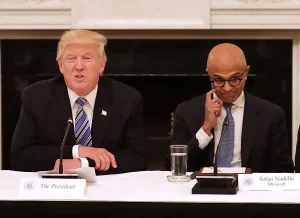How Satya Nadella Plans to Outsmart Trump-Era Tariffs with Software
New Delhi | May 2, 2025
Microsoft CEO Satya Nadella has proposed a “software-first” approach to cushion the impact of renewed Trump tariffs under former President Donald Trump’s economic policy.

During Microsoft’s earnings call on April 30, Satya Nadella addressed how the company plans to navigate the inflationary pressures and cost uncertainties driven by escalating tariffs—without heavily depending on physical product margins.
“Software Is the Most Malleable Resource”
Satya Nadella emphasized that Microsoft’s strength lies in its software ecosystem, which can serve as a powerful buffer for both the company and its clients. “Software is the most malleable resource we have to fight inflationary or growth pressure,” he said, highlighting how cloud-based and AI-driven services enable organizations to optimize operations with fewer resources.
This “do more with less” mindset is being positioned as Microsoft’s core strategy in light of global economic headwinds, including tariff fluctuations.
Minimal Mention of ‘Tariffs’ — But Strategic Implications
Interestingly, the word “tariff” only came up once in the prepared remarks of the earnings briefing. Microsoft CFO Amy Hood pointed to “tariff uncertainty” as a reason behind elevated inventory levels, which unexpectedly drove a 3% year-over-year growth in Windows OEM and devices revenue.
While Microsoft still markets physical products such as Surface laptops and Xbox consoles, its revenue is predominantly software- and services-based. This focus allows it to remain less exposed to the direct impact of import duties when compared to hardware-heavy rivals like Apple or HP.
Potential Challenges Remain
Despite this shield, the tech giant isn’t completely immune. Satya Nadella noted that macroeconomic ripple effects could still affect client budgets, particularly in enterprise software purchases. Moreover, Microsoft’s dependence on international components—like Nvidia’s high-end GPUs used in AI infrastructure—means that indirect tariff-related cost escalations are possible.
Still, Satya Nadella expressed confidence in Microsoft’s ability to absorb and adapt to such shocks, suggesting the company may also pass on efficiency gains to clients.
Broader Tech Sector Context
As U.S.-China tensions persist and trade policies continue to evolve, companies with diversified business models—especially those grounded in software—may find themselves better positioned to weather the storm. Microsoft appears to be one of them.
